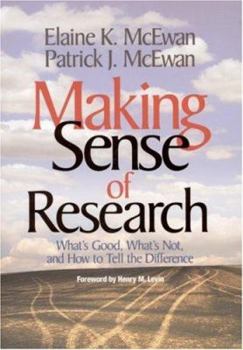Making Sense of Research: What′s Good, What′s Not, and How to Tell the Difference
Select Format
Select Condition 
Book Overview
This book is for practitioners at all levels, from teachers making site-specific decisions to administrators making schoolwide and policy decisions.
Format:Paperback
Language:English
ISBN:0761977082
ISBN13:9780761977087
Release Date:March 2003
Publisher:Corwin Publishers
Length:200 Pages
Weight:0.83 lbs.
Dimensions:0.6" x 6.9" x 9.9"
Customer Reviews
3 ratings
Making Sense of Research
Published by Thriftbooks.com User , 14 years ago
This book is great! It looks at educational research with a critical eye and doesn't just present things from a myopic viewpoint.
Guide for Educational Research
Published by Thriftbooks.com User , 16 years ago
I am the coordinator of secondary student teaching at Lindenwood University in St. Charles, Missouri. I am also a research consultant for a counseling program at a large school in the St. Louis area. This book takes an in-depth look at research in the educational realm without delving into statistics or mathematical data. The key idea in this book is how to come up with the right research question(s), which can be the most important aspect of this process. Then the book goes on to discuss what some of the results truly mean and why they are important. For those interested in educational research, it is a good supplement to the texts on methodology, and it may just help you to understand and enjoy this experience. William H. Blackburn, Ph.D.
find the right problems
Published by Thriftbooks.com User , 16 years ago
The research in this book is that of educational research. Where perhaps you are interested in investigating the efficacy of some proposed teaching pedagogy. The McEwans offer assistance in a lucid and non-mathematical manner. Other research texts might delve into how to frame hypotheses and test them, with statistical rigour. But this book eshews that approach. Instead, it describes in a qualitative fashion higher level issues. Like how to ask the right questions. Part of the skill in doing original research starts with this aspect. And it is crucial. Because posing the right questions might mean being able to focus on the key issues that you can then try to resolve. This chapter of the book could be the most important to the reader. Another take on the chapter was an observation years ago by the Nobel physicist, Richard Feynman. He remarked that at the highest level of physics, most have the same ability to solve a given problem. But the real genius comes in finding the right problems to work on. Just as germane in educational research. Other chapters of the book cover issues almost as vital. Like being careful about the difference between causality and correlation. Or doing meta-analysis across existing research reports. Plus, the book offers insight into the sociology of who does most educational research.





